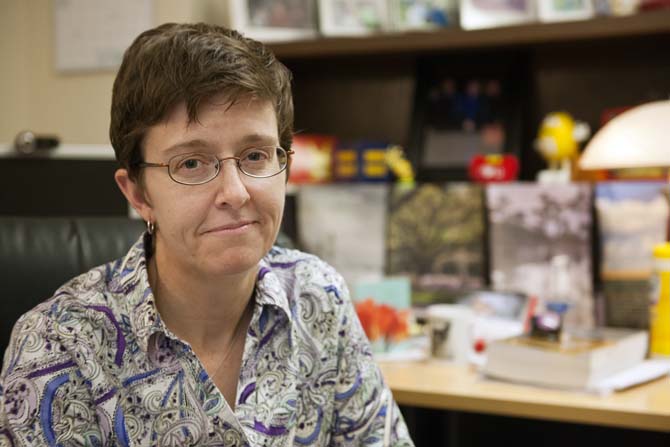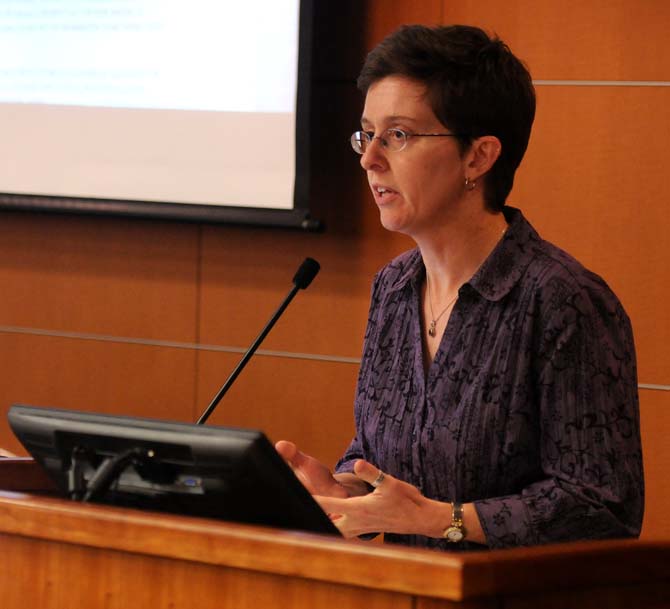Elaine Maccio comes to work every day, teaches her classes and conducts research just like any other University professor. However, unlike many of her colleagues, she faces an unusual burden.
Maccio worries about where her partner will receive health care coverage, something many of her heterosexual colleagues do not have to worry about.
Following domestic partnership benefit resolutions that passed in both the Student Government and Faculty Senate, the policy remains to be decided on by the University’s Board of Supervisors.
Despite passing in both the SG Senate and the Faculty Senate with immense support, several members of the Board said they were unaware of any discussions related to domestic partner benefits.
“I’d make my decision based on what’s in front of me,” said Board member Lee Mallett. “There’s nothing in front of me at the moment.”
Board member Ronnie Anderson said he did not know if such a policy would pass, but it would be an interesting discussion.
In fall 2012, Maccio, who teaches in the School of Social Work, said she started casually asking around about domestic partner benefits with high-ranking University officials.
Maccio said one of those individuals was A.G. Manaco, associate vice chancellor of Human Resource Management, who advised her to push for resolutions to be passed in the faculty, staff and student senates.
Maccio then introduced a resolution to the Faculty Senate last November. The resolution was approved on Dec. 5, 2012.
Maccio said she had been in contact with SG members at the time of the Faculty Senate’s vote, including former SG President Taylor Cox and former SG Director of Academic Affairs Thomas Rodgers. Both introduced Maccio to University Center for Freshman Year Senator Brian Rees, author of the SG domestic partnership benefits policy resolution.
The resolution, which officially gave SG’s support to the implementation of a policy offering health benefits to University employees who are in a domestic partnership, passed the SG Senate on March 20 with 91 percent approval.
Former SG Speaker of the Senate Meredith Westbrook said she was glad her branch of SG passed the resolution.
“I’m very proud that we passed it,” Westbrook said. “I think it’s a good starting point.”
The next step would be for the Staff Senate to vote on a resolution, which has been a fairly difficult process, Maccio said.
“They were not as responsive as the other senates,” Maccio said.
Over the past week, several phone calls from The Daily Reveille to Staff Senate President Chad Gothreaux and President-Elect Lynn Livingston were not returned.
Westbrook said she urges her staff counterparts to give the legislation a chance.
“I would encourage everyone on campus, including Staff Senate, to explore these options and the benefits of this legislation,” Westbrook said.
After being advised by Katrice Albert, vice provost for Equity, Diversity and Community Outreach, Maccio said she met with a number of deans and associate deans to discuss the possibility of domestic partnership benefits. All voiced support for the policy, she said.
Many of the deans felt this would make the University much more competitive to attract and retain faculty, Maccio said, and the policy would not only attract LGBT faculty but progressive heterosexual faculty who believe their co-workers should be treated fairly.
She said she realized the need for a domestic partnership benefits policy at the University when her partner lost her health insurance.
“To be honest, this policy was a bit selfish,” Maccio said.
Maccio’s partner lost her job at a mental health agency due to state budget cuts in June 2010.
She said her partner had to get private health insurance, which was difficult because she had a pre-existing condition.
“Because she has asthma, which is considered a pre-existing condition, she was denied by Blue Cross Blue Shield,” Maccio said.
Maccio said she had to do something about the inequality affecting her partner’s life.
“For me to be able to live with myself, I had to try to do something about this,” Maccio said.
With the success of the resolutions in faculty and student senates, Maccio said the real challenge to this policy will come from the University’s Board of Supervisors.
Maccio said she doesn’t expect the policy to make it through the Board of Supervisors.
“We will probably not have domestic partnership benefits any time soon,” Maccio said, “but we have to try anyway.”
Staff writer McKenzie Womack also contributed to this report.
“We will probably not have domestic partnership benefits anytime soon. But we have to try anyway.”








